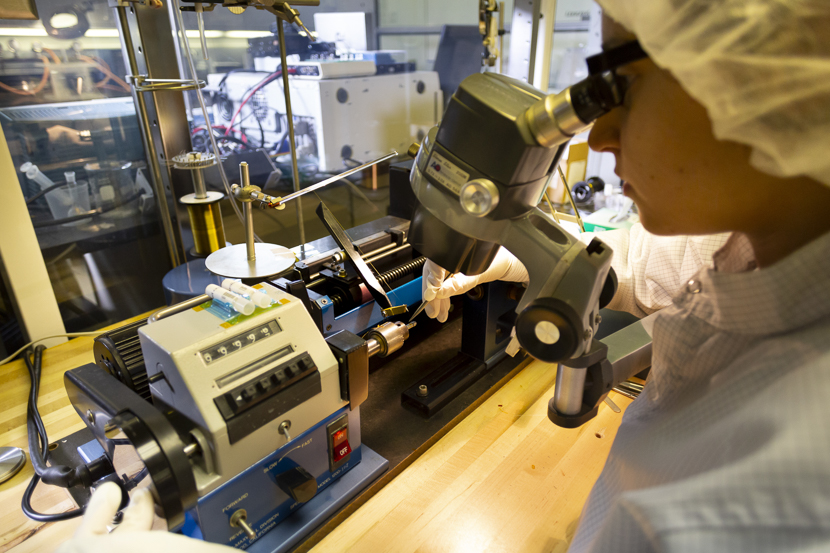Biomedical engineering (BME) faculty at Illinois Tech focus their research efforts in one of three specific areas: cell and tissue engineering, medical imaging, and neural engineering.
Research on the Edge
Just a few areas of research expertise among Illinois Tech biomedical engineering faculty include:
- Medical imaging, including phase-sensitive X-ray imaging
- Machine learning
- Molecular imaging
- Hydrogels, cell-biomaterial interactions
- Signal and image processing
- Cancer research
- Retinal vascular occlusion
- Brain electrophysiology, chaos control of epilepsy
- Neural prostheses
Biomedical Engineering Research Areas
Biomedical engineering (BME) faculty focus their research efforts in one of three specific areas: cell and tissue engineering, medical imaging, and neural engineering.This research area seeks to understand and attack biomedical problems at the microscopic level and use such knowledge to engineer replacement tissues and organs from individual cells. Knowledge of anatomy, biochemistry, and the mechanics of cellular and sub-cellular structures is needed to understand disease processes and to target interventions.
Abhinav Bhushan
Associate Professor of Biomedical Engineering
Expertise: Microfluidics, organ-on-chips, tissue engineering, biosensors, gaseous volatile organic compound (VOC) sensors, finite element analysis, mathematical and data modeling
Natacha DePaola
Professor of Biomedical Engineering and Director of IDMET
Expertise: Biofluid dynamics, cell mechanics, and tissue engineering
Georgia Papavasiliou
Associate Professor of Biomedical Engineering
Expertise: Hydrogels, cell-biomaterial interactions, drug delivery, polymer reaction engineering
Marcella Vaicik
Assistant Professor of Biomedical Engineering
Expertise: Biomaterials, tissue engineering, cell-matrix interactions, 3D culture model systems, regenerative medicine
Medical imaging encompasses a wide range of technologies (including MRI, CT, ultrasound, PET, etc.) that permit visualization of the internal structure and function of the human body. Medical imaging is an essential part of today's health care, biomedical research, and drug development, and is one of the most important contributions that engineering has made to patient care.
Cutting-edge areas of medical imaging include development of new types of imaging, new hardware and computer software, and new ways of using, visualizing, and analyzing medical images.
Konstantinos Arfanakis
Professor of Biomedical Engineering
Expertise: MRI, MRI acquisition and post-processing, diffusion tensor MRI (DTI), functional MRI (fMRI)
John G Georgiadis
R. A. Pritzker Professor and Chair, Department of Biomedical Engineering
Expertise: Brain and Muscle Biomechanics, MRI, Transport Phenomena in Fluids
Boris Gutman
Assistant Professor of Biomedical Engineering
Expertise: Medical image analysis, neuroimaging, imaging biomarkers of neurodegenerative disease, imaging genetics, brain connectivity analysis, computational differential geometry, anatomical shape analysis
Keigo Kawaji
Assistant Professor of Biomedical Engineering
Expertise: Magnetic resonance imaging (MRI), data acquisition, image reconstruction, clinical post-processing, cardiac MRI, neurovascular MRI, quantitative biomarkers, biomedical instrumentation, artificial intelligence in biomedicine, BME education pedagogy, mathematical problem-solving in BME
Kenneth Tichauer
Associate Professor, Department of Biomedical Engineering
Expertise: Molecular imaging, tracer kinetic modeling, cancer research
This research area applies fundamental and applied engineering techniques to help solve basic and clinical problems in neuroscience. At a fundamental level, neural engineering seeks a better understanding of the behavior of individual neurons, their growth, signaling mechanisms between neurons, and how populations of neurons produce complex behavior.
Obtaining such information improves understanding of the communication that occurs between various parts of the nervous system and the brain, which can lead to the development of replacement parts and other treatments for impaired neural systems.
David J. Mogul
Professor Emeritus of Biomedical Engineering
Expertise: Brain electrophysiology, chaos control of epilepsy, cellular and network behavior
Philip R. Troyk
Director of the Neural Engineering Program
Robert A. Pritzker Endowed Chair in Engineering
Executive Director of the Pritzker Institute of Biomedical Science and Engineering
Expertise: Neural prostheses, implant design, computational neuroscience




